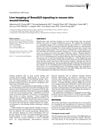
Search
for
Sort by
Research
600-630 / 1000+ results

research Bone Morphogenetic Proteins and Their Antagonists in Skin and Hair Follicle Biology
Bone Morphogenetic Proteins (BMPs) help control skin health, hair growth, and color, and could potentially be used to treat skin and hair disorders.

research Female Pattern Hair Loss: A Clinical and Pathophysiological Review
Female Pattern Hair Loss affects women's self-esteem and needs more research for better treatment.

research Effects of the Lexington LaserComb on Hair Regrowth in the C3H/HeJ Mouse Model of Alopecia Areata
The Lexington LaserComb helped regrow hair in mice with a condition similar to human hair loss.

research Frontal Fibrosing Alopecia: Reflections and Hypotheses on Etiology and Pathogenesis
FFA's causes may include environmental triggers and genetic factors.

research Approach to the Adult Female Patient with Diffuse Nonscarring Alopecia
The document concludes that careful evaluation is key to diagnose and treat women with hair loss, with tests for thyroid, iron, and hormones as needed.

research The Role of Micronutrients in Alopecia Areata: A Review
People with alopecia areata often have lower levels of vitamin D, zinc, and folate, but more research is needed to understand if supplements can help treat it.

research Transcriptional Profiling in Alopecia Areata Defines Immune and Cell Cycle Control Related Genes Within Disease-Specific Signatures
The study found that immune responses disrupt hair growth cycles, causing hair loss in alopecia areata.

research The Role of Lymphocytes in the Development and Treatment of Alopecia Areata
Lymphocytes, especially CD8+ T cells, play a key role in causing alopecia areata, and targeting them may lead to new treatments.

research Bacteria Induce Skin Regeneration via IL-1β Signaling
Skin bacteria, specifically Staphylococcus aureus, help in wound healing and hair growth by using IL-1β signaling. Using antibiotics on skin wounds can slow down this natural healing process.

research Use of Radiofrequency in Cosmetic Dermatology: Focus on Nonablative Treatment of Acne Scars
Nonablative radiofrequency treatments, especially microneedle and fractional types, can improve acne scars by 25%–75% after 3-4 sessions, with full results in 3 months and some side effects.

research Pro-Regenerative Hydrogel Restores Scarless Skin During Cutaneous Wound Healing
A special hydrogel helps heal skin without scars and regrows hair.

research Cysteine Prevents the Reduction in Keratin Synthesis Induced by Iron Deficiency in Human Keratinocytes
Cysteine helps maintain keratin production in skin cells even when iron is low.

research An Investigation of Vitamin D Status in Alopecia Areata
People with alopecia areata often have lower vitamin D levels and more inflammation, suggesting vitamin D might be involved in the condition.

research Methods for Quantifying Intrafollicular Drug Delivery: A Critical Appraisal
The document concludes that there is no agreed-upon best method for measuring drug delivery within hair follicles and more research is needed to validate current techniques.

research The Influence of Interferon on Healthy and Diseased Skin
Type I interferons play a key role in the development of various skin diseases.

research Promising Alternative Clinical Uses of Prostaglandin F2α Analogs: Beyond the Eyelashes
Prostaglandin F2α analogs show promise for treating certain types of hair loss but need more research for other skin conditions.

research Comprehensive Overview of Hidradenitis Suppurativa
The document concludes that lifestyle changes and medical treatments can significantly reduce symptoms of Hidradenitis Suppurativa, a chronic skin condition.

research Oral Zinc Therapy for Zinc Deficiency-Related Telogen Effluvium
Taking zinc supplements can help improve or cure hair loss caused by zinc deficiency.

research Retinoid Metabolism Is Altered in Human and Mouse Cicatricial Alopecia
Altered retinoid metabolism in cicatricial alopecia suggests a balanced vitamin A diet may prevent the condition.

research Effects of Finasteride on Apoptosis and Regulation of the Human Hair Cycle
Finasteride affects hair growth by changing caspase and XIAP levels, potentially treating hair diseases.

research Therapeutic Advances in Trichology
Recent advances in hair loss treatments show significant progress.

research An Investigation of Apoptosis in Androgenetic Alopecia
Apoptosis contributes to hair loss in androgenetic alopecia.

research Alopecia Areata: Overview and Treatment Options
Alopecia Areata is an autoimmune hair loss condition that needs more research for better treatments.

research A Case of Inflammatory Nonscarring Alopecia Associated With the Tyrosine Kinase Inhibitor Nilotinib
A cancer drug called nilotinib might cause hair loss due to inflammation around hair follicles.

research Female Pattern Hair Loss: An Overview
Female pattern hair loss treatments vary in effectiveness and may have side effects.

research Marie Unna Hereditary Hypotrichosis Caused by a Novel Mutation in the Human Hairless Transcript
A new mutation in the HR gene causes hair loss in a specific family.

research Live Imaging of Smad2/3 Signaling in Mouse Skin Wound Healing
Smad2/3-dependent TGF-β signaling increases during wound healing.

research Steroid-Sparing Effect of Mycophenolate Mofetil in the Treatment of a Subepidermal Blistering Autoimmune Disease in a Dog: Clinical Communication
Mycophenolate mofetil helped reduce steroid use in treating a dog's autoimmune skin disease.

research Comparison of the Treatment Outcome of Oral Tofacitinib with Other Conventional Therapies in Refractory Alopecia Totalis and Universalis: A Retrospective Study
Tofacitinib works better and is more tolerable for severe alopecia than conventional treatments and DPCP immunotherapy.